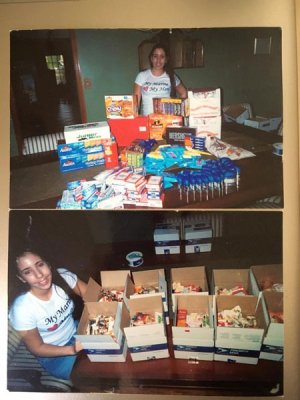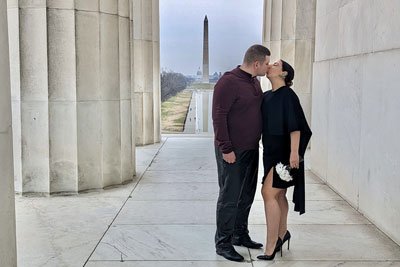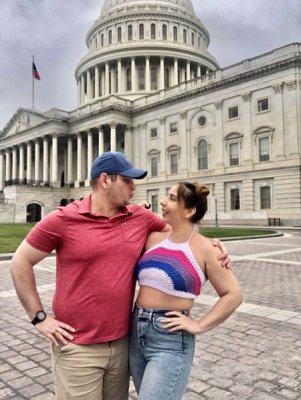Our Love Was a Casualty of War, Destroyed by Time, Distance, and Things We Couldn’t Say
In the days after the planes struck on that cloudless, sun-soaked Tuesday morning, a pack of military recruiters descended upon a South Florida high school.
The recruiters’ mission-focused gaze cut through the early afternoon humidity like a drill instructor’s knife-hand. In lockstep formation, the recruiters paraded across the quad with a singular purpose: to capitalize on the shock, anger, and sheer hubris of teenagers hungry for video-game-style vengeance.
It was weaponized patriotism on full display. And it worked. That day, a small group of seniors enlisted in the Marine Corps infantry.
A tall, chiseled, blond senior was one of them. He planned to play ice hockey, dabble in modeling, and have an otherwise ordinary college experience. Instead, he would ship out to boot camp immediately after receiving his diploma.
At his graduation the following spring, a recruiter approached me, a smug smirk planted on his face. “Your little sophomore friends are gonna be so jealous that you got a man in uniform,” he whispered coyly.
Incredulous, I assured the recruiter that he was mistaken. “Ah, man. That’s messed up. He didn’t tell you?” the recruiter chuckled, amused with schadenfreude. That was the moment I discovered my high school sweetheart had joined the Marine Corps.

Melissa A. Sullivan packs care packages for troops as part of Operation H.E.R.O., a service project she began after her high school sweetheart went to war. Photo courtesy of author.
I was devastated. Not only had he kept this secret for months, but the person I loved had wrapped his deceit in the star-spangled banner. We had talked about going to college together, getting married, and having children. The military did not seem to fit into that mix.
His actions, though perhaps noble, blindsided me. I struggled to understand why he acted unilaterally. I had no idea how to be a partner to someone in the military. How long would he be gone? Would he be in danger? How would his decision impact my life?
His recruiter was right. My jaw dropped when I saw him in the iconic Marine Corps dress blues for the first time. It was as if Ken had been drafted.
When he accompanied me to prom a few years later, he thoroughly enjoyed his celebrity status in our community. Strutting around the ballroom in my knee-length, banana-hued, frilly BCBG dress, I felt like royalty. The euphoria was almost enough to make me forget the botched bangs I had acquired days before.
Teachers excitedly shook his hand, girls gawked openly, and he basked in the shameless hero worship. It was the era of Dubya and raging nationalism; the attention he received from well-wishing strangers affirmed that serving his country was a righteous and worthwhile endeavor. In an about-face from my initial reaction to his enlistment, I felt incredibly proud to be by his side.
Things were less glamorous when he deployed to Fallujah, Iraq. I watched cable news religiously, desperate to find a correspondent embedded with his unit so I could get real-time updates. It was the middle of the global war on terror, and casualties mounted.
My heart sank whenever I heard that a Marine convoy hit an improvised explosive device. The harrowing images of mutilated American corpses strewn from bridges haunted me.
In the weeks between our missives, I envisioned the worst-case scenario—a life-changing combat injury, a prisoner of war, death. Every time a dark-colored sedan crept by my house, I prepared to hear the chaplain’s long, heavy knock of a KIA notification.
Award-Winning Journalism in Your Inbox
I kept busy to quell my unrelenting anxiety. I created a service project to send reminders of home to those stationed overseas. On deployment, mail call is a critical connection to the homefront. It provides a fresh boost of morale when the fog of war has suffocated nearly every joy of human existence.
While the service project occupied most of my days, the evening loneliness crushed me. For seven months, I had been fighting my own battle with depression. A friend suggested a social outing to help liven my spirits. I reluctantly agreed. What was supposed to be a carefree evening out on the town ended horrifically—I was drugged and raped. I sunk deeper into the darkness.
Just before his return from the Middle East, I had an abortion. The aftermath was a blur of anesthesia, recovery medication, and the heavy disassociation I relied on for survival. When he arrived stateside, we locked eyes as he wove through the massive crowd at the homecoming celebration on base.
After almost a year of no physical contact, he yearned to be intimate. But he was not the man I had sent off with a tearful embrace. His expression was distant, and his demeanor had hardened. He often isolated himself.

Melissa A. Sullivan and her spouse, an active-duty Naval officer, on their wedding day. Photo courtesy of the author.
Concerned about his well-being, I confronted his leadership; they dismissed me as a silly outsider. I was also a shell of my former self—reeling with guilt, shame, and grief. I did not disclose what happened to me while he was deployed. We were both keeping secrets from each other.
His preoccupation with war became more intense, as did his temper. He exploded with rage over minor things: an unrinsed dish, an out-of-place bath towel, an unexpected object on the side of the road.
I thought I could fix him, that it was my job. The more I tried to advocate for his mental health, the more resentful and belligerent he became. Ultimately I accepted that our generation’s forever wars had forever changed him. Our love was collateral damage, destroyed by time, distance, and the things we could not speak of.
I finally left when I felt my physical safety was compromised—a sour ending to the sickly sweet, Y2K bubblegum pop origin of our courtship.
The dissolution of our five-year relationship began my obsession with broken people. Their sadness echoed the void within me. I became a martyr, fixated on rescuing others while ignoring my trauma—textbook avoidance tactic. I moved to Washington, D.C., and built a career advocating for the veteran and military populations. I tried to give my pain a purpose. If not, what was the point?
I threw myself into work, frantically attempting to right the wrongs of the past while never permitting myself to heal. In an ode to my Catholic upbringing, I thought suffering proved that I was sorry. Sorry I had failed the first person I ever loved.
If only I had sent six dozen more care packages, I thought, maybe things would have turned out differently. Yes, surely it was the lack of nonperishables and mailable tchotchkes that had led to our demise. Regardless, I decided, I had been derelict in my duties. I relished these pointless thought exercises as a form of self-flagellation.
More than a decade later, I married the first person who treated me kindly. Kindness alone cannot sustain a marriage, of course, and I retreated to my parent’s home in Florida during the separation.

Melissa A. Sullivan and her spouse in Washington, D.C., on National Coming Out Day. Photo courtesy of author.
On the day of my divorce, I celebrated my newfound singledom by barhopping with my boxing class. As I approached the entrance of a nearby convenience store for sustenance, I noticed a familiar frame facing the entrance. The figure wore a weighted black vest with white block lettering that spelled “police.”
It was him. Of all the possible reunion scenarios I had imagined, the unflattering light of a convenience store at 3 a.m. while celebrating a divorce was not among them. At least I had the whole revenge body thing going for me. Thank God for small favors.
I had rehearsed this hypothetical interaction a million times since our split. I would tell him how badly I felt about the way our relationship ended, and that for years I wondered almost every day if he was OK. Then he would tell me all was forgiven—a Hollywood ending.
In reality, I blabbered a string of incoherent nonsense. Something about politics and an op-ed I had recently published. He talked about his pregnant wife and how the Marine Corps had led him to law enforcement. Then we did the most millennial thing conceivable. We took a selfie. Mainly because I knew no one aware of the saga would have believed me.
Our Journalism Depends on Your Support
I made a lengthy post on social media about the run-in, complete with photographic evidence. But the truth was that our interaction was frustratingly disappointing. I waited years for absolution, yet it remained elusive. The hollowness of our meeting and his facade of normalcy made me realize that closure was never his to give. It was mine to claim.
At long last, I did. I accepted that I was not responsible for his choices or the unraveling of our relationship. I had paid my penance 10 times over. I deserved blissful happiness. I finally gave myself permission to receive it.
Today, I am married to an active-duty Naval officer. He will inevitably deploy, probably multiple times. Whatever happens to him, we have both decided, we will talk about it. I know now that I am not responsible for the searing horrors war inflicts. I never was.





Comments are closed.